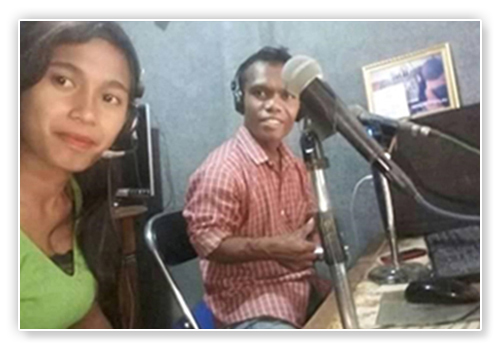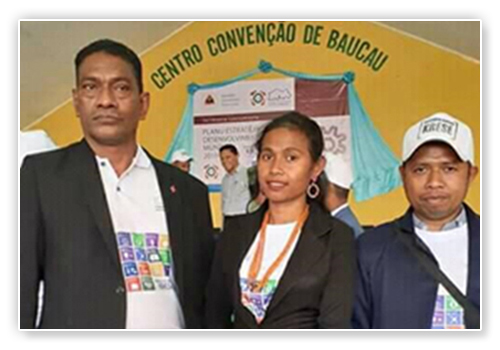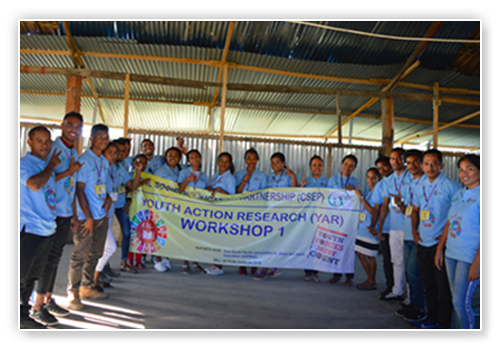
Concept and Approach
"No action without research; no research without action."
Kurt Lewin (as quoted in Marrow, 1969, p.163)
The term "action research" was first coined by social psychologist Kurt Lewin in 1934, to describe a form of research that combined social science research with social actions designed to affect social change. He saw the process of action research as a ‘spiral’ that consisted of reflection, analysis, fact-finding, planning, execution, which in turn, would result in more reflection, analysis, and further actions. Lewin believed that the best way to learn about social systems was to try and change them. He worked with minority groups, particularly ethnic and racial minorities, and propagated the use of action research to understand and end the exploitation and prejudice they faced.
Action research develops the powers of reflective thought, discussion, collective decision-making, and action towards social transformation. In action research, the researcher does not merely observe and interpret information but also employs the findings to identify and solve problems and improve the field of research.
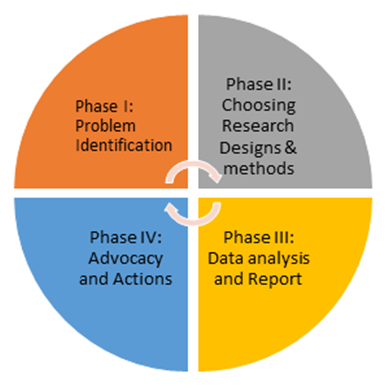
Historically, Participatory Action Research has been applied in several fields. Many have strategically used it as a powerful tool for social activism and liberation movements in regions such as Latin America, Africa, and India, while some have used it in the fields of organisational development, learning, and management (for instance, use of action research to improve teachers effectiveness, etc.). A few other groups, like feminist researchers, continue to use it as a qualitative method because it empowers the participants by fostering an equal and close relationship, thereby breaking the hierarchy between the researchers and those researched.
The application of participatory action research for social change is particularly important. It argues that the fundamental purpose of action research is to empower participants (from marginalised communities) by developing their critical consciousness about socio-political situations and to equip them with tools for their liberation (Freire, Selener, 1997). The idea of using research for social action and community development has impressed many field practitioners.
Further, Tandon (1981) highlights three critical aspects of participatory action research, which are (a) research: where people are actively involved in all the stages of an investigation- from identifying the problem to designing, planning, reporting, and evaluating, (b) education: collectively people explore, learn and analyse root causes of the problem and its possible solutions and (c) action: the findings are implemented and joint actions are taken for bringing positive change in the lives of people.
To summarise, the key features of participatory action research are as follows-
- It is an alternative approach to knowledge production that empowers community researchers and assists in finding solutions to their problems.
- It is participatory and aims to break the inherent hierarchies involved in the researchers and the research.
- It is collaborative and believes that the sharing of diverse knowledge, skills, and talents fosters collective growth. Co-learning and co-investigation- where people embark on joint exploration, questioning, and learning are considered integral components of the process.
- It uses ‘action-reflection’ as one of the primary learning methods.
- It is subjective (and not value-neutral), situation-based and context-specific.
- It encourages marginalised people to reflect, understand and document their lived reality and hence, enables them to gain greater voice and control over their lives.
While action research has become more popular in education and even corporate spaces as a tool to examine and improve the practice of education or improve organisational processes, there has been a resurgent interest in using action research in development practice. Such research is sometimes known as ‘Participatory Action Research’ and draws inspiration from the concept of ‘Participatory Research’ which was inspired by social activism movements in Africa, Latin America, and India. Paulo Freire, a Brazilian educator and social activist who founded the ‘Pedagogy of the Oppressed’ can also be said to have influenced the concept of participatory research. Freire believed that the purpose of education was to enable the oppressed to regain their sense of humanity: to become aware of their oppression and be enabled to overturn it.
The notions of oppression, conflict, and social justice are central to the approach of participatory action research. Hence, such research is directed towards issues of social transformation. The underlying assumption in PAR is that those in power control the production and use of knowledge in society. This monopoly over knowledge makes it easier for those in power to justify being in power, as well as deny opportunities and freedoms to the less powerful groups. Therefore, the approach of PAR is to enable the less powerful groups – the oppressed – to become creators of their knowledge, which will challenge the knowledge of the powerful and overcome the structural aspects of their oppression.
Action research is, therefore, distinctly different from conventional research because it democratises and decentralises knowledge creation practices. It is offered as an alternative for knowledge development where the ‘new’ knowledge is co-created with the people, in their local context, and for their transformation.
Youth-led Action Research (YAR) is an innovative form of participatory action research where adolescents and youth are involved as experts in an investigation, analysis, and actions for the individual and community development. This emphasises the potentials of youth to produce authentic knowledge, take leadership, and engage in civic work with an enhanced critical lens. It also provides opportunities for young people to analyse their levels of marginalisation and social structures and identify ways to turn them around.
Within the youth and adolescent sector, ASPBAE focuses its work on marginalised youth, those who are excluded from social services and denied their human rights because of difficult circumstances brought about by age, gender, socio-economic status, ethnicity, political differences, geographical location, and disability.
This research approach not only recognises young individuals’ agency, knowledge, and potentials but also invites them to lead the entire research process. This brings a shift in adult-adolescent power, allowing youth voices to surface and nurture organic talent.
Figure 1 below depicts the four phases of youth-led action research; these phases are interconnected and flexible. Depending on the context, the group can decide to start at or revisit different phases throughout their project.
Impact Stories
1. Shodhini – A Quest for Freedom
Sonali Kailash Tongare, India
Courageous and sprightly Sonali Kailash Tongare has been a part of a Youth-led Action Research on girls’ education initiated by Abhivyakti Media for Development, an NGO based in Nashik, India in partnership with ASPBAE. As a Shodhini, she carried out the research in her village along with a group of girls as peers. Through her journey, she and her peers have overcome several challenges of everyday patriarchy and gendered violence. Through collaborative research and engagement, they eventually convinced their parents and other community members to reclaim their right to access public spaces at night.
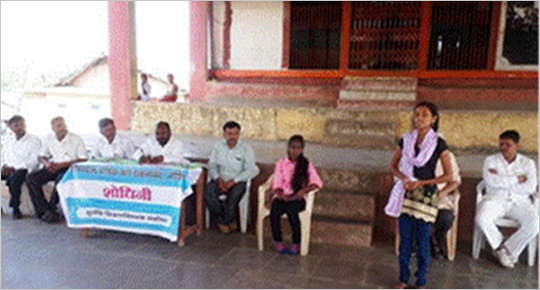
To know more about Sonali’s journey, play this video.
2. Single Parent taking action
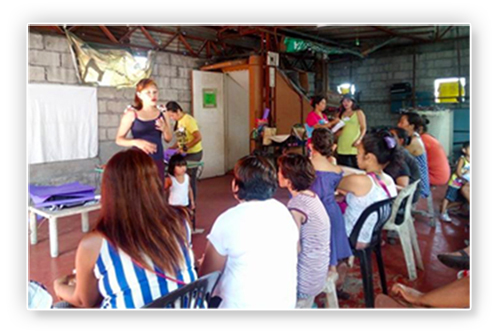
Mai-Mai, Philippines
Mai-Mai, a young woman researcher from an urban poor community in the Philippines writes about the story of single parents taking action.
"When our organisation, Youth for Nationalism and Democracy (YND) became a partner of ENet Philippines in the YAR Project, I participated in the project. I was the team leader for our area in Quezon City where the YAR for Urban was conducted. While doing the project, I came across young women and men in my community who share the same background and circumstance as myself– stricken by poverty, young solo parents, were not able to finish formal schooling but still hold on to a dream of obtaining an education. YND thought of organising them. We consulted these young solo parents regularly and planned the formation of a Solo Parent Organisation in our community in Bagbag. We were able to form a group that is mostly made up of the young women and men who participated in the YAR.
We conducted education among ourselves on our rights as solo parents as provided under the Solo Parent Act. We found out that many of the provisions in the law are not being implemented and that we have rights as solo parents. Pursuing these rights became the basis of our plan of action and activities. Until now, we are active in our community and we continue to hold seminars for our members while we continue to recruit new members. Presently, we are working towards building a centre "Arugaan" for our young children while we pursue alternative education and livelihood. We know that challenges and barriers continue to exist so while we continue to consolidate our organisation, we also partner with the government, especially the local government, and with non-governmental organisations to help us in our plans. We are doing a lot of education work through the help and guidance of YND, not only on solo parent issues but also on other issues in our society that affect our lives and communities."
3. Research informs advocacy: a case study of Timor-Leste
Angela Soares, Timor-Leste
Jose, a youth mentor in the Timor-Leste, writes about how he used youth-led action research for his advocacy work and also encouraged a young girl named Angela to take leadership in disseminating the research findings.
"Youth-led Action Research (YAR) brought multiple opportunities for marginalised youth, especially those who have difficulties in accessing education (both formal and non-formal) due to their poor socio-economic status in Timor-Leste. Through YAR activities these youth now have access to capacity building activities and are involved in governance work. They now feel confident to share their ideas, perspectives, and suggestions with local authorities, CSOs, and other fellow youth.
These youth have met their respective Chief of Villages and Municipal Administrators in presenting their research results as part of the advocacy movement at the local level. Angela Soares is a marginalized youth researcher who has contributed much in doing the local advocacy in Baucau Municipality where she lives. She shared the YAR report with all the stakeholders in Baucau village, such as Municipal Administrator, Administrator Post Administrative of Baucau, Chief of Villages, and CSOs. She had received a positive response from many authorities and was invited by the local community radio called "Radio Komunidade Lian Matebian Baucau" to share her YAR experiences and recommendations.
As a result of the consistent efforts and follow-up, local authorities were able to appreciate CSEP’s research work and started implementing the research recommendations. Ms. Angela Soares is now working as a volunteer at the office of Wailili Sub-village in supporting the Chief of Sub-village especially on marginalised youth development tasks. She also volunteers with an NGO Unidade Feto ba Dezenvolvimento (UFD), which is the CSEP member based in Baucau Municipality. Through her many engagements, she continues to strengthen research advocacy.
We were also able to establish positive relationships with the ministries and facilitated dialogue between youth, community, and the government authorities. For example, Maria Jose da Fonseca Monteiro de Jesus, Secretary of State for Equality and Inclusion (Timor- Leste), addressed the youth group in one of CSEP’s trainings. In her speech, she emphasised the importance of the training for marginalised youth as it would be beneficial for the government to have proper data on their situation related to education, gender, health, and other issues. The Secretary also stated that the government would be able to formulate appropriate policies, undertake adequate planning, and initiate and implement relevant programmes to respond to the issues and findings raised by the YAR report. She further committed her willingness to share the findings and recommendations of the study with other line ministries. She congratulated and appreciated the partnership between CSEP and ASPBAE in building leadership capacities of marginalised youth in Timor Leste.
Due to its popularity, the YAR project was requested to be extended to two more municipalities and six targeted villages in the second year. This expansion was a positive outcome of our first research report, which we had submitted to the Civil Society Cabinet under the Prime Minister’s Office in Dili, Timor-Leste. We see many positive outcomes of this approach and would like to continue this work with the participation of more youth across the country."
